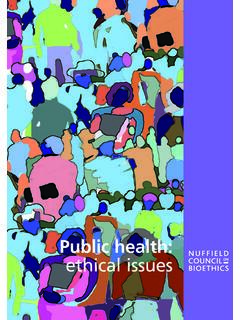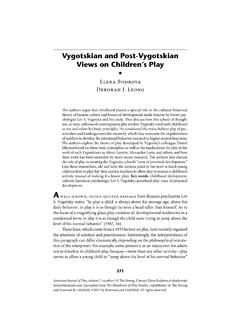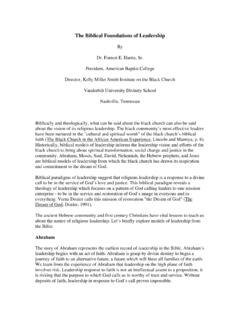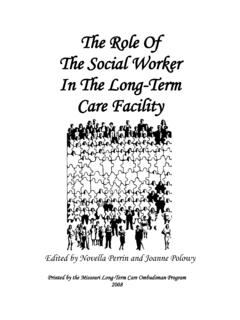Transcription of Dementia: ethical issues
1 dementia : ethical issues a guide to the report In October 2009, the Nuffield Council on Bioethics published a report, dementia : ethical issues , which considers the ethical issues that arise in the context of dementia . ethical difficulties arising in dementia include: deciding when and how to communicate a diagnosis;. balancing a person's safety with their need for independence and freedom;. deciding what is in the best interests of the person with dementia , for example when making decisions about their care and treatment;. recognising that the needs of the person with dementia may sometimes conflict with the needs of others, especially carers;. tackling discrimination against people with dementia ;. allocating resources to support people with dementia ; and deciding what priority to give to dementia research.
2 The report was produced by an expert Working Party. To inform its deliberations, the Working Party consulted a wide range of people, including those with direct experience of living with dementia , people working in the field of dementia , and other members of the public. This guide sets out some of the conclusions and recommendations that are discussed in more detail in the report. Notes in square brackets throughout refer to the chapters and paragraphs in the report. Table of contents What is dementia ? 01. An ethical framework 02. What is an ethical approach to care? 04. dementia and society 06. Making decisions 08. Dilemmas in care 12. The needs of carers 14. Research 16. dementia : ethical issues a guide to the report 01. What is dementia ? A person with dementia will usually experience a progressive decline in their mental abilities because of damage to the brain.
3 This damage may have many causes, including Alzheimer's disease, vascular dementia and Lewy body dementia . The signs and symptoms of dementia include memory and communication problems, difficulties in daily living, changes in mood and behaviour, and the gradual loss of control of physical functions. However, we are beginning to understand how much people with dementia can still do and experience, despite the effects of their illness. About 700,000 people in the UK currently have dementia and this is likely to increase to million by 2051. Older people are more likely to develop dementia one in five of us by the age of 85. However, some younger people develop dementia too. dementia costs the UK over 17 billion a year. Even with the best support, a person with dementia will usually experience significant changes in their life as a result of their declining mental abilities.
4 These may lead to ethical problems for the individual with dementia , for family and friends who provide unpaid care and support (described as carers' in the report), for those providing paid care (care workers and professionals such as doctors), and for society as a whole. There are no easy answers to these problems, but the aim of this report is to suggest ways of approaching them. 02 NUFFIELD COUNCIL. ON BIOETHICS. An ethical framework The report sets out a 6 part ethical framework' to help those who face dilemmas in connection with the day-to- day care of someone with dementia . This framework also provides the basis for the recommendations to policy-makers we make throughout the report. As with any framework, it will need to be applied flexibly, and with compassion.
5 There will rarely be one right' answer to any particular ethical difficulty [para and box ]. Component 1: A case-based' approach to ethical decisions ethical decisions can be approached in a three stage process: identify the facts that are relevant to the specific case;. interpret and apply appropriate ethical values to those facts; and compare the situation with other similar situations to find ethically relevant similarities or differences. Component 2: A belief about the nature of dementia dementia arises as a result of a brain disorder, and is harmful to the individual. Component 3: A belief about quality of life with dementia With good care and support, people with dementia can expect to have a good quality of life throughout the course of their illness.
6 dementia : ethical issues a guide to the report 03. Component 4: Promoting the interests both of the person with dementia and of those who care for them It is generally accepted that autonomy and well-being are important aspects of our lives. This is just as true for people with dementia . Autonomy is often defined as the freedom to make your own choices, but people rarely make decisions in isolation. Autonomy can be promoted in people with dementia by encouraging relationships that are important to the person, and by supporting the person in maintaining their sense of self and expressing their values. A person's well-being includes both their moment-to-moment experience of pleasure, and more objective factors such as their level of mental ability. The separate interests of carers must be recognised and promoted.
7 Component 5: Acting in accordance with solidarity We are all dependent to some extent on one another (a concept often referred to as solidarity') and people with dementia are fellow citizens. We therefore have a responsibility to support people with dementia , both within families and in society as a whole. Component 6: Recognising personhood, identity and value The person with dementia remains the same, equally valued person throughout the course of their illness, regardless of the extent of the changes in their mental abilities and other functions. Support for all those providing care One of the key messages in the report is that those supporting and caring for people with dementia need much more support in tackling the ethical problems they meet every day.
8 Guidelines are helpful, but not enough. We conclude . Professionals and care workers providing care to people with dementia should have access to ongoing education to help them respond to ethical problems. Carers (family and friends who provide unpaid care and support) who wish to access such education should be able to do so. Professionals, care workers and carers should all have access to forums where they can share and receive support in making ethical decisions [paras ]. 04 NUFFIELD COUNCIL. ON BIOETHICS. What is an ethical approach to care? Good, ethical care recognises the value of the person with dementia . It aims to promote their well-being and autonomy. At the same time, it pays attention to the interests of carers who provide so much of the day-to-day support.
9 We conclude . How things are done, so that people with dementia feel that they are valued individuals, will often be far more important than the particular structure or format of services [para ]. Professionals and care workers should treat families as partners in care', reflecting the solidarity being shown within the family [para ]. Diagnosis Early diagnosis has important benefits, but not every person with dementia will find that these advantages outweigh the possible disadvantages. A timely diagnosis is one which is at the right time for the person concerned, and for their family. We conclude . People should have access to good quality assessment and support from the time they, or their families, become concerned about symptoms that relate to a possible diagnosis of dementia .
10 Doctors giving a diagnosis of dementia should actively encourage the person with dementia to share information with their family [paras ]. There is some evidence to suggest that people in some cultural groups may be more hesitant in coming forward for diagnosis than those from other cultural groups, possibly because of stigma (see also page 6). dementia : ethical issues a guide to the report 05. We conclude . Further research should be carried out on the reasons why there is variation between cultures in readiness to come forward for diagnosis, and the role that misinformation and misunderstanding plays in these reasons [para ]. Information and ongoing support Access to supportive care, including appropriate information, emotional support and practical support, is essential for people to live well with dementia .












